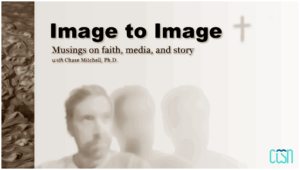 Column: Image to Image: Musings on Faith, Media, and Story
Column: Image to Image: Musings on Faith, Media, and Story
December entry: “Self-Sacrifice + Self-Gift”
Column Description: Image to Image: Musings on Faith, Media, and Story is a monthly column that illuminates old and new ideas about media ecology from a Christian perspective. Dr. Mitchell will explore what it means to bear God’s image and Christian witness in a mediated world, with a particular focus on the relationships between theology, media, and orthopraxy across different Christian traditions.
By Chase Mitchell, Ph.D.
Assistant Professor of Media and Communication, East Tennessee State University
March 2025 / February 2025 / January 2025 / December 2024 / November 2024 / October 2024 / September 2024 / August 2024 / September 2023 / June 2023 / January 2023 / September-October 2022 / July 2022 / June 2022 / April-May 2022 / January 2022 / November 2021 / October 2021 / September 2021
Self-Sacrifice + Self-Gift
As we move into the Lenten season, Christians direct our attention to what is coming: the suffering and death of Jesus. The liturgy instills a sense of somber waiting and dreadful expectation. We are reminded that the Cross is on the horizon. It also recalls our own death. Ash Wednesday… memento mori.
Many Christians, perhaps for its solemnity and liturgical proximity to Good Friday, misconceive Lent as a time of sacrifice. We forfeit sweets or alcohol or social media in a kind of mild asceticism because, we think, in doing so, we’re reenacting (or participating in) Christ’s sufferings. Fasting is not misguided practice; indeed, I think it’s far too much ignored in many Christian communities. But fasting needs to be grounded in right theology. When it’s not—when we go without or temper our vices for the wrong reasons—we miss the point.
It’s not that sacrifice isn’t part of the equation. Christ’s self-emptying in life and death, His atoning sacrifice, is the source and sustenance of our life. Christians are called to imitate their Lord in long-suffering love—to lay down our own will, our whims and desires—out of love for God and others. Fasting is sacrificial if my efforts in some way address another person’s hunger. For example, if my neighbor is starving and I fast so they can eat my food. I give up something because somebody else needs it; my loss is their gain. But Lenten fasting is not a sacrifice, per say, because it’s not (supposed to be) done for God. God gains nothing from my lack.
Fasting, then, is wrongheaded (wrong-hearted?) if the ascetic’s primary frame of reference is “sacrifice.” Unfortunately, I think too many of us take this approach, usually unawares, simply because fasting feels like a sacrifice. It hurts to forgo my morning cup of coffee.
It’s better to approach Lent, and fasting in general, as self-gift.
Jesus is our guide. I often wonder how He could’ve enjoyed the Last Supper knowing what was to happen that night and the following day. How could anyone relax, let alone savor food, drink, and company, when they knew that they were about to experience betrayal, abandonment, horrible suffering, and death? I know I wouldn’t be able to do it. But even if most of us would quail in anxiety and fear in the face of what Jesus had to endure, we can learn something from the fact that He did.
Jesus’ entire life was self-gift. Sometimes that entailed (painful) sacrifice, and we see many times throughout His life and ministry, not just at the end: He exhausted Himself healing the multitudes. He walked hundreds of miles to reach people. He went hungry. But other times, Jesus gave Himself in ways that weren’t necessarily painful or even very hard. He gave Himself in the mundane and in the celebratory: He made His bed. He attended weddings and (probably) danced. He told jokes.
Put simply: Jesus knew how to give Himself to all things; how to abide each moment. Lent is less about discipline and more about opening ourselves to God’s accompaniment. It’s about learning how to abide. Your presence is more satisfying to me than a caffeine rush, Jesus. Unless and until we can honestly say that, we should consider laying off the Mountain Dew and committing ourselves to deeper habits of prayer.
Lent is not merely Good Friday’s liturgical precursor. Yes, the season is meant to instill in us knowledge of our own mortality, to remind us of the consequences of sin. It leads us to the Cross. But if we foreground the theme of sacrifice—that is, if we collapse Lent and Good Friday into one solemn event—we overlook an important theological truth and miss an essential part of the Christian life. Rather, if we learn to abide the Lenten season in the spirit of self-gift, we can face death and despair in righteousness and hope. We can laugh at our silly habits and turn to Christ in joyful expectation.
God doesn’t need me to give up coffee for forty days. He gains nothing from such a “sacrifice.” But he does want me to be dependent on Him. In giving myself more fully to Jesus, even in something as simple as my caffeine addiction (I mean…coffee habit), my heart is reformed, my faith is deepened, and my life is enriched by relying more on the gift-Giver, and less on His gifts.
* The views of any CCSN columnists are their own, and do not necessarily represent the views of the CCSN. We invite and embrace a wide range of views and critiques on important communication and cultural issues from a Christian perspective. The CCSN is a community of Jesus followers who study communication. We do not support or promote a particular social, political, or denominational agenda.
